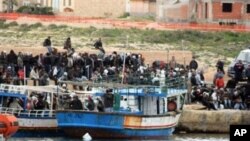The people of Lampedusa, the southern-most island in Italy and the first port of call for migrants fleeing the strife in North Africa, have been preparing themselves for potential mass arrivals. So far authorities have managed to keep the situation under control but there are fears this will not last.
The people of Lampedusa fear it’s just a question of time. Soon, they say, their island will again be inundated with migrants fleeing the political turmoil in North Africa. After the collapse of the Tunisian regime in mid-January, more than 6,000 arrived on the tiny southern island, braving the stretch of sea that separates it from the African coastline.
Most are young men who hope they will be able to find a job and send money back to their families. Murad is one of the Tunisians who recently arrived and is staying at the holding center on the island. He said he came from Zarzis to look for work because he says there is unemployment in Zarzis and all over Tunisia.
As long as the sea and weather conditions allow for a safe enough crossing, the boats keep coming with the migrants. Simona Moscarelli is the representative of the International Organizations for Migration on the island. She said when the flows stop, the stop is determined either by bad weather conditions or lack of boats but once these obstacles are overcome the flows resume. She says they expect to see more flows from Tunisia and then migrants arriving from Libya.
Since the start of this new emergency, the authorities have managed to move the migrants fast enough from the holding center in Lampedusa to others in Sicily and on the Italian mainland.
But there is concern that this will no longer be possible if the number of arrivals start to increase dramatically. Italy’s Interior Ministry Roberto Maroni told a parliamentary committee this week there are about 1.5 million illegal immigrants in Libya, some estimate even 2.5 million.
Maroni added that these migrants had arrived in Libya because of poor patrols on the country’s southern border, and are now fleeing the unrest following the uprising against Moammar Gadhafi’s regime.
Italian Island Crowded by North African Refugees




